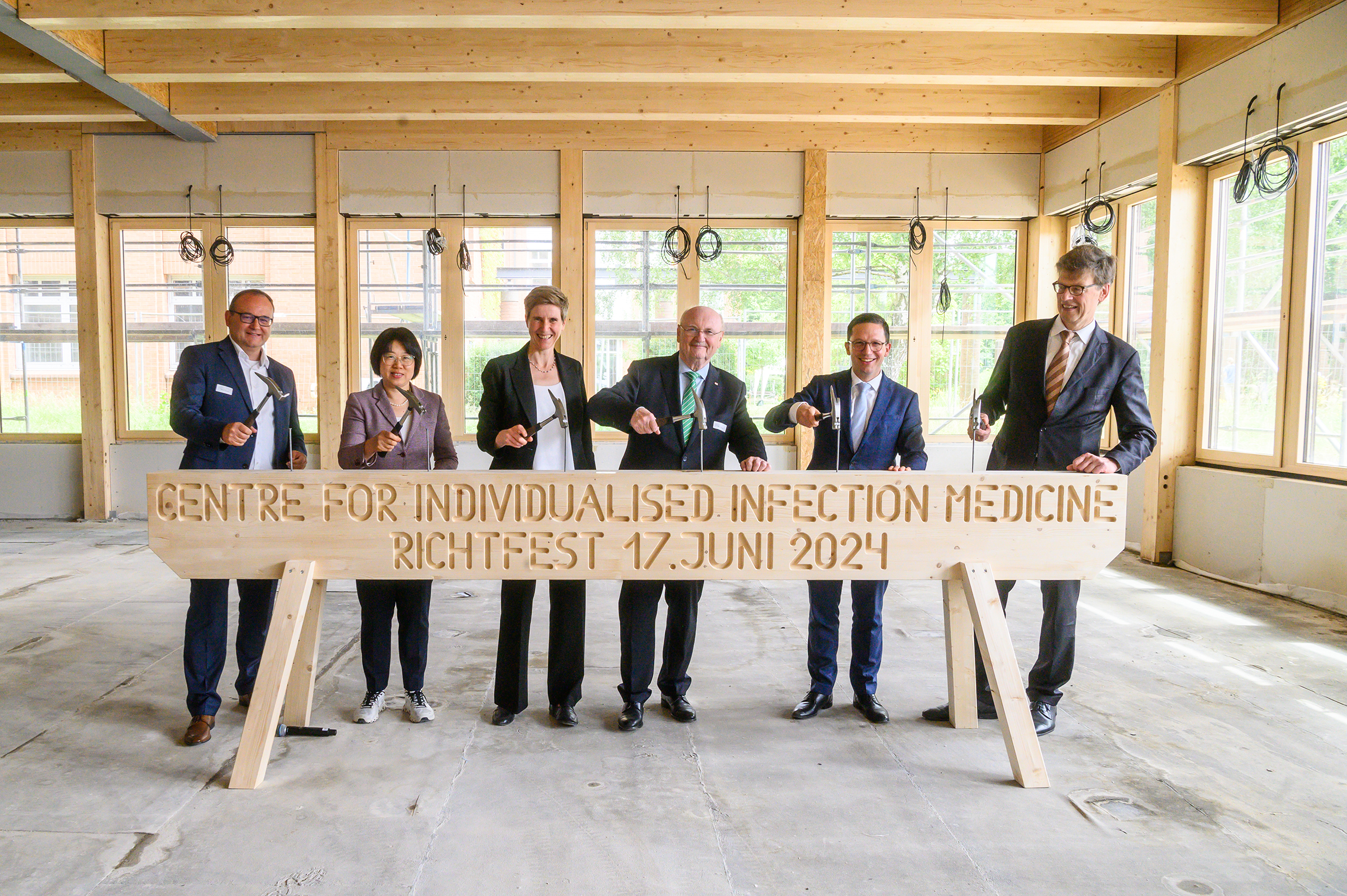Science Minister Falko Mohrs: "Standards are being set here in the field of personalized medicine"

Markus Cornberg, CiiM-Direktor; Yang Li, CiiM-Direktorin; Jennifer Debarry, CiiM-Koordinatorin; Michael Manns, Präsident der MHH; Falko Mohrs, Niedersächsischer Minister für Wissenschaft & Kultur; Christian Scherf, Admin. Geschäftsführer des HZI (from left). Copyright: CiiM/medJUNGE
A joint research institute of Hannover Medical School (MHH) and the Helmholtz Center for Infection Research (HZI) has been seeking answers to the pressing questions of infection medicine for almost ten years. Today, the Center for Individualized Infection Medicine (CiiM) celebrated the topping-out ceremony for the construction of its own research building. At present, the first research groups and departments are still housed in the building of the neighboring TWINCORE - Center for Experimental and Clinical Infection Research, which was also founded by MHH and HZI.
Bringing findings from the lab to the bedside quickly
"High-performance infection research and innovative solutions in the field of personalized medicine are essential for the best possible prevention of infectious diseases and tailor-made therapies for patients.The Centre for Individualized Infection Medicine is already providing strong impetus in this area," said Lower Saxony's Science Minister Falko Mohrs at the topping-out ceremony in Hannover.
"With the interdisciplinary pooling of expertise from various areas of clinical practice and research under one roof, a research infrastructure is being created here in Hannover that will set standards in the field of personalized medicine. It will make a significant contribution to quickly transferring clinically relevant findings from the laboratory into practice and thus to the patient's bedside."
Realizing the vision of individualized infection medicine
"As the founding director of CiiM, I am delighted to celebrate this important milestone and to see our idea take shape," explained MHH President Prof. Michael Manns. "The individual character of the modern research building will provide the ideal infrastructure to realize our vision of individualized infection medicine. Through targeted research and innovative technologies, we can develop customized prognoses, diagnoses and therapies for each individual patient and thus make a decisive contribution to the fight against infectious diseases."
Initially founded as a virtual center
The CiiM was initially founded in 2015 by the HZI and the MHH as a virtual center in order to be able to start research work directly. The focus of the CiiM is on the development of individual diagnostics and therapies for infectious diseases. The CiiM is currently home to the HZI departments "Bioinformatics of Individualized Medicine" led by co-director Prof. Yang Li and "Personalized Immunotherapy" led by Prof. Kathrin de la Rosa, as well as the MHH research groups "Immunology of Viral Hepatitis and Infections in Liver Cirrhosis" led by co-director Prof. Markus Cornberg, "Clinical Bioinformatics" led by Prof. Cheng-Jian Xu and the CAIMed junior research group "AI & Bioinformatics".
Individualized infection medicine at the highest level
"Having our own building for the CiiM is invaluable and underlines the importance of our work. Here we can combine the expertise of our scientists and physicians under one roof and make optimal use of the synergies that arise from this close collaboration," says Prof. Cornberg. Prof. Li adds: "We are convinced that this joint location will bring our center a big step closer to its goal of practising individualized infection medicine at the highest level."
"The CiiM is the most visible future project of the HZI with the Hannover Medical School. This building will bring the research of the HZI and the MHH even closer together," says Christian Scherf, Administrative Director of the HZI."I am pleased to be able to demonstrate the HZI's ability to act within the Helmholtz Association with this research building. Despite major challenges in the construction sector, we have succeeded in constructing a modern research laboratory building of the very highest standard and will be able to use it jointly in the future. Helmholtz Infection Medicine takes place at this location in Hanover together with the MHH and the neighboring TWINCORE."
Sustainable timber hybrid construction
The new building was designed and planned by Telluride Architecture and will provide 2100 square meters of floor space and will be one of the first wet laboratory research buildings in Germany to be built using sustainable timber hybrid construction. The federal government, the state of Lower Saxony, the Helmholtz Association and the HZI are bearing the costs.
Text: Inka Burow